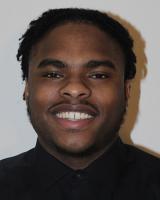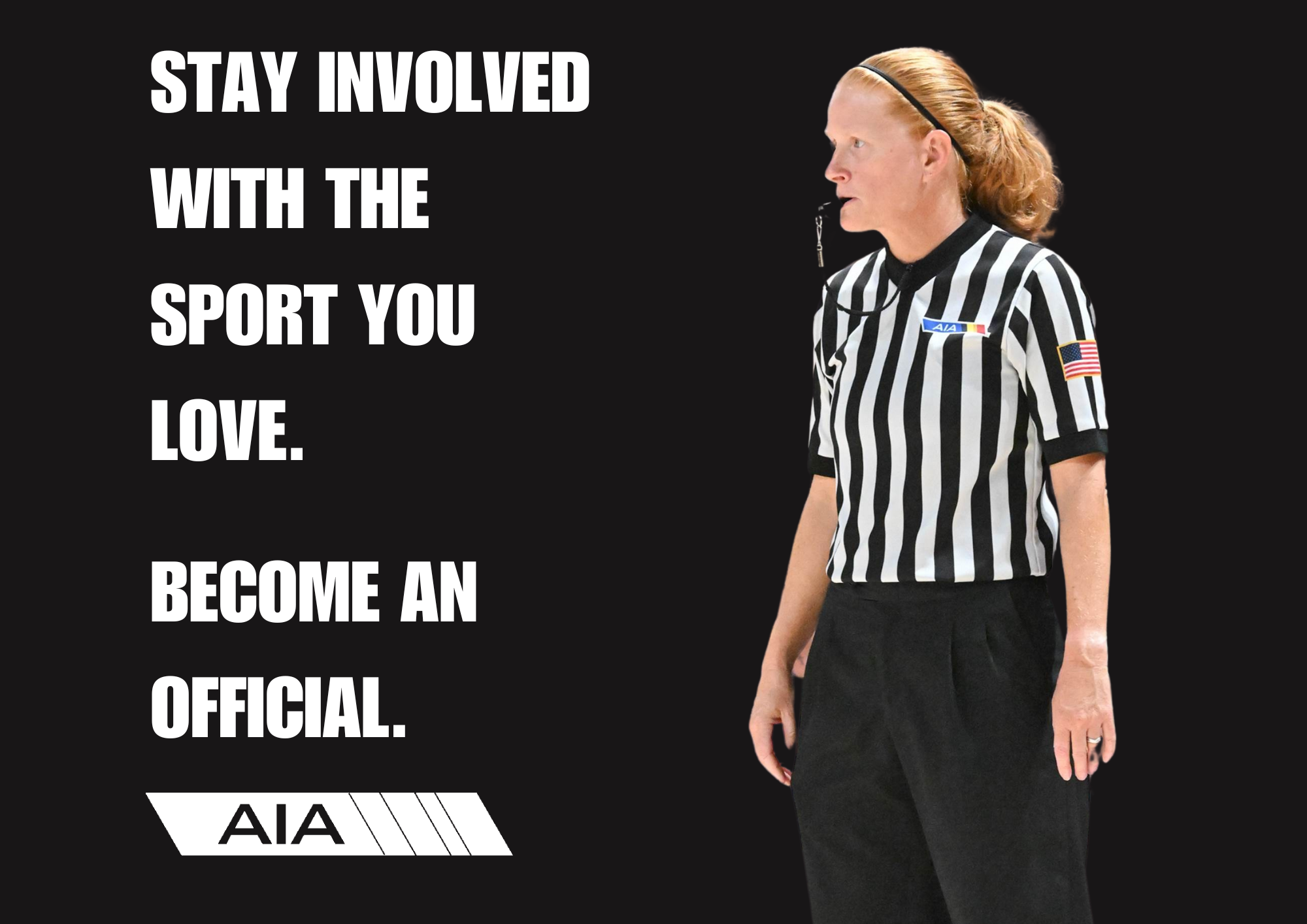Despite her many gifts, it’s Jaz Cobb’s humility that shines
November 5, 2023 by Josh Heron, Arizona State University
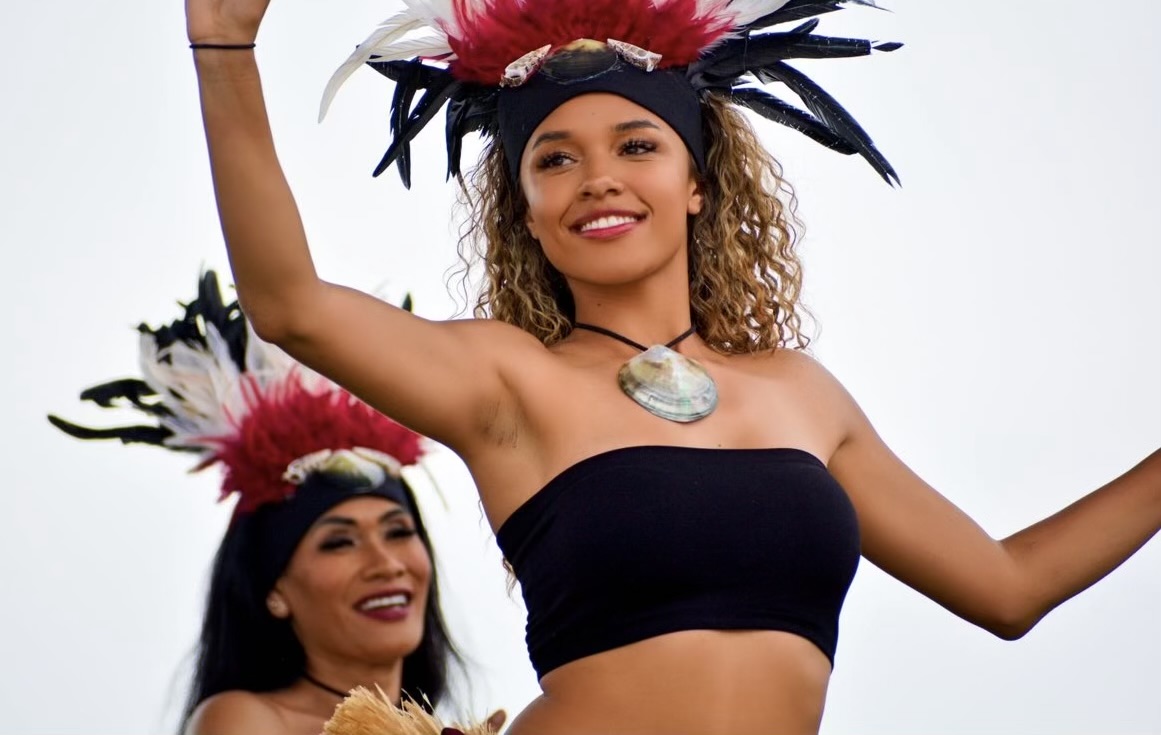
Joshua Heron is an ASU Cronkite School of Journalism student assigned to cover Veritas Prep Academy for AZPreps365.com
Two years ago, Veritas Prep senior Jaz Cobb returned home following an overnight emergency trip to the hospital. The only issue was that she didn't know it was her home.
Twenty-four hours earlier, everything had gone dark.
A versatile Cobb had lunged to execute a volleyball hit only to find herself blacked out seconds later.
In a moment, the brevity of life exposed itself when she rolled over a ball at varsity practice during her sophomore year, slamming the back of her head on the floor.
In a moment, Jaz lost her short-term memory.
"Those following hours were chaotic," Cobb said. "I forgot my stepdad's name, where I lived, and more. Only if I see videos and pictures or people remind me clearly, then I will remember some things."
The home Jaz briefly forgot, however, provided experiences she vividly remembers. "Fanoa," or forty in the Tongan language, rests on 40th Street in Phoenix and is home to Cobb's vast yet tight-knit Tongan family. At the “base,” an alternative name the family uses for Fanoa, rarely will one find the doors locked, rarely will one find the house empty.
"After my parents divorced when I was nine, my mom, two brothers, and I probably moved about six times," Cobb said. "Although I don't remember every living situation, I remember Fanoa. My great-grandmother was the matriarch of our family's generational home, and basically, all of my aunts and uncles lived on the same block, so most of my cousins either lived there or would come over all the time."
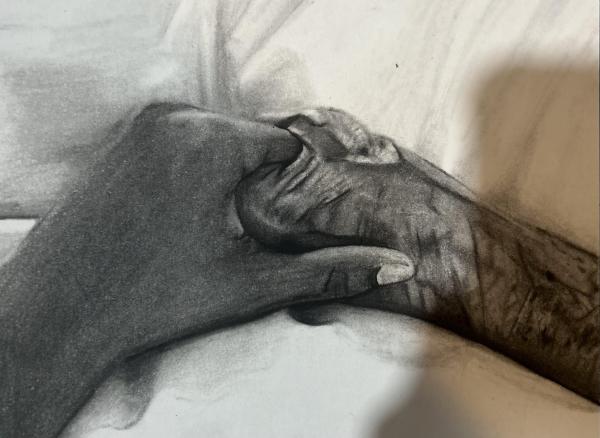 A sketch of Cobb holding her great-grandmother’s hand. The family’s “queen,” as Cobb coined her, passed away during Cobb’s sophomore year. (Photo courtesy of Jaz Cobb)
A sketch of Cobb holding her great-grandmother’s hand. The family’s “queen,” as Cobb coined her, passed away during Cobb’s sophomore year. (Photo courtesy of Jaz Cobb)
Cobb first moved into Fanoa in middle school and then again in her sophomore year. She admits to struggling while living at her family home.
"My time there wasn't always the best. At times, my mental health was terrible," Cobb said. "I remember constant chaos, not focusing on homework because the house was small and there were so many of us, smelling like food going to school, and sharing one bathroom with a huge family. I sometimes felt stuck and resorted to calling my dad when I needed to escape."
Cobb acknowledges the tranquil atmosphere when with her dad's side of the family. Describing her time as "peaceful" and "happy," she appreciated even the freedom of having her own bathroom and recognized her dad's sacrifice to make her content.
However, when she left Fanoa, she realized an inescapable, overwhelming appreciation for the place that crafted her desire to embrace, explore, and share her Polynesian culture.
"Even though I would be happy at my dad's house, I still felt like I didn't really belong," Cobb said. "I felt I belonged to the Polynesian culture. That house is my entire childhood, and even though I felt excluded at times because I wasn't fully Polynesian, through the holidays, barbecues, dance festivals, and my uncle initiating fights with my cousins to see who was stronger, my love and understanding of my culture grew to the point where I felt inclined to share it with others."
While there are various ways to express her culture, Cobb's affinity is for Polynesian dance. She remembers her mom bringing her to dance practices as a kid.
"I always tried to join them," Cobb said. "My first performance was in front of hundreds when I was about three or four, and despite my nerves, all you see is little baby Jaz dancing in the middle, getting all the attention. That day, I knew I could dance forever."
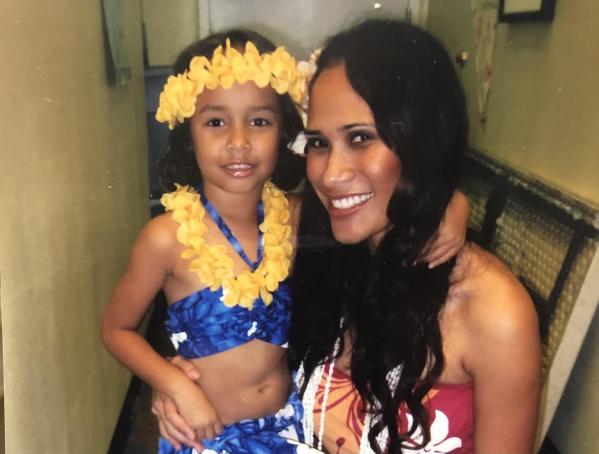 Cobb and her mom at a dance event. Cobb credits her mom for her love for dance. (Photo courtesy of Jaz Cobb)
Cobb and her mom at a dance event. Cobb credits her mom for her love for dance. (Photo courtesy of Jaz Cobb)
Cobb wants to attend the University of Hawaii, where she can prosper culturally and hopefully innovate through dance. Although she knows she won't be the only dancer there, she desires to host small dancing events that offer volunteer opportunities for other students with the end goal of building her own dance group.
"Dancing is like building a project," Cobb said. "The process is hard because of the research required, but in the end, everything feels amazing. You feel at peace."
Jaz helps younger dancers with their "project" every Wednesday evening while still finding time to practice for herself as they prepare for the 30th anniversary of the annual Arizona Aloha Festival, which takes place this upcoming March 16th and 17th at Tempe Town Lake from 10 a.m. to 5 p.m.
Teaching young kids is a task her time at Fanoa prepared her for.
"At Fanoa, I had to babysit a lot and learned how to love kids well," Cobb said. "I wanted to be their parental figure when their parents were not home. Quickly, I realized how fun children are, in addition to being drawn to their honesty and affection. I don't know what it is, but they give you a different type of entertainment."
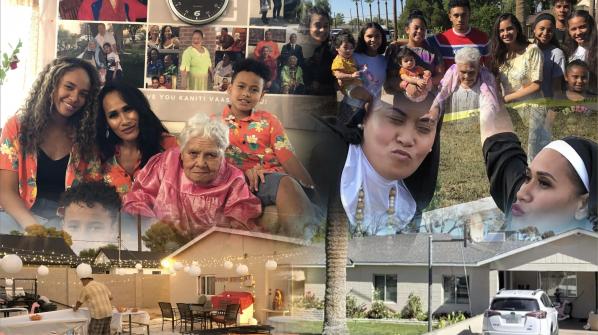 Memories from Fanoa. (Photos courtesy of Jaz Cobb)Cobb hopes to become a child psychologist. The way kids flock to her is affirmation she is on the right path.
Memories from Fanoa. (Photos courtesy of Jaz Cobb)Cobb hopes to become a child psychologist. The way kids flock to her is affirmation she is on the right path.
"The kids at Veritas always come up to talk to me, and I love it," Cobb said. "I just want to be a role model for them, and growing up as the older sister in a split household granted me the opportunities to step in and be a leader when it came to things like chores, so I feel like these experiences have given me the patience needed to care for kids well."
Cobb's mom, Fita Hola, also grew up at Fanoa. She believes their decision to move back to Fanoa in 2017 and care for Cobb's great-grandmother contributed to her daughter's outlook on helping others. Hence, Cobb's impact isn't limited to those younger than her but felt by her peers too.
Sydney Mishkin, Cobb's best friend and volleyball teammate, is encouraged by the delight in which Cobb edifies others.
"She always makes things fun, knows how to make light of nearly any situation, and uplifts those around her,” Mishkin said.
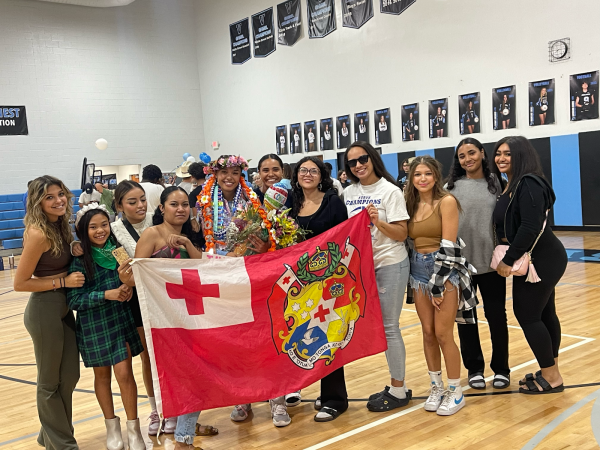 Her family appeared in abundance for Jaz’s Senior Night on Oct. 18. They didn’t leave their culture at home either. (Photo courtesy of Jaz Cobb)
Her family appeared in abundance for Jaz’s Senior Night on Oct. 18. They didn’t leave their culture at home either. (Photo courtesy of Jaz Cobb)
That is great for her teammates, however, as for her opponents on the court, things are far from fun when facing Cobb.
Her fights with her cousins at Fanoa and the injuries she suffered from them paid off as Cobb's strength is fully displayed with her fear-striking volleyball kills. She led her team in total regular season kills with 187. She also ranked top-15 in the 2A conference in digs this season. Her efforts earned her second-team all-region honors in her final season.
Veritas volleyball coach Brooks Dockter believes Cobb's drive distinguishes her as an athlete.
"She is up for anything and is always ready to compete," Dockter said. "When she is on the court, she is an electric personality that kids feed off of."
When volleyball season is complete, the nets are put away, the hoops descend, and Jaz transforms from outside hitter to shooting guard. Last season, she led Veritas to an 11-10 record, averaging a team-high 10.6 points and 9.7 rebounds per game.
She made the varsity team for both sports her freshman year, three years after she started playing volleyball and two after basketball.
However, Cobb knows her performance on court is a stark reflection of her performance in the classroom.
"I won't do well in sports if I don't do well in the classroom," Cobb said. "School is a priority because the colleges I want to attend are not easy schools to get into. That motivates me, though."
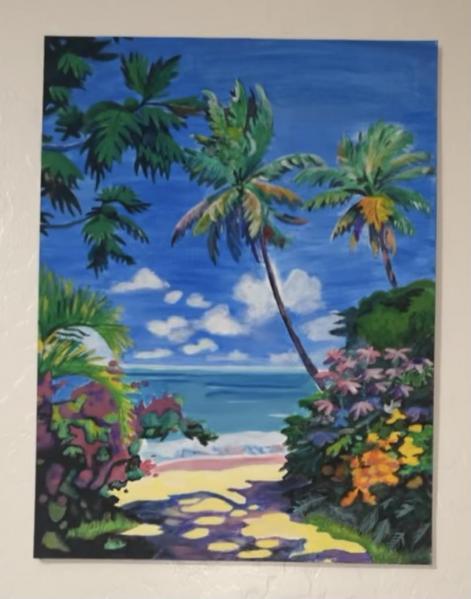 A painting by Cobb of Hawaii. Her dream college is the University of Hawaii. (Photo courtesy of Jaz Cobb)Cobb has a 3.8 GPA and got accepted to all Arizona schools she applied to. A graduation trip to Fiji is the reward for her hard work.
A painting by Cobb of Hawaii. Her dream college is the University of Hawaii. (Photo courtesy of Jaz Cobb)Cobb has a 3.8 GPA and got accepted to all Arizona schools she applied to. A graduation trip to Fiji is the reward for her hard work.
Throughout the years, she has cemented herself as a model of excellence for Veritas. But, she found out early that the journey in a predominantly white school wasn't going to be easy after encountering racism in the second grade.
"When I dressed like a princess, a classmate told me, 'Princesses can't be black.' They excluded me and asked me, 'Why are you so dark?' The comments even extended to my family. My dad alerted the school and was told that I was bullying those who were bullying me."
"Even after that whole incident, I think my parents still wanted me to attend the school because there was no other school like Veritas academically."
However, Hola kept her oldest child at Veritas for a lesson that a grade on paper couldn't teach. The Tongan native remembered when she arrived in the states from the Polynesian island in Oceania in 1987 and faced similar issues.
"When I came from the islands, I was the darkest person in the school at the time," Hola said. "So, I know for Jaz, it was hard because she was getting made fun of at Veritas, a school not as multicultural as other schools in the area. But, there are lessons in that."
"She was able to grow thick skin," Hola said. "Therefore, if she didn't deal with her experience at Veritas, then she would struggle when she encountered the same thing later."
Hola wanted Jaz to realize that people's validation, or lack thereof, doesn't determine her worth.
"I know no matter where she goes, someone will have something to say about her," Hola said.
So, most importantly, it was an opportunity for me to assure her, 'The color of your skin doesn't matter, and you're beautiful no matter what others say.' And even when she struggles today, her belief in God and prayer gets her through and keeps her firmly grounded."
That firm foundation offers a platform where Jaz expresses her other gifts beyond sports and dancing.
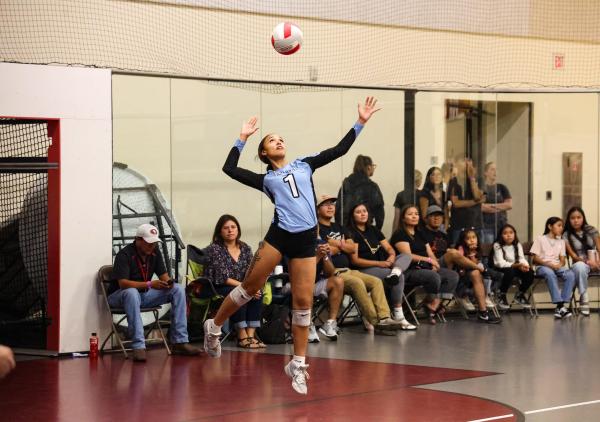 The volleyball captain was second on her team in serving aces during the regular season. (Joshua Heron photo/AZPreps365)
The volleyball captain was second on her team in serving aces during the regular season. (Joshua Heron photo/AZPreps365)
When the 18-year-old isn't moving her body to a smooth, culturally infused rhythm while reminiscing on the Tongan fruit drink called Otai, digging and killing, or exercising her fluid jumper, she finds herself writing songs, playing the ukulele, painting, or singing. Sometimes, two gifts intertwine, like when she sings the national anthem before home volleyball games.
She is a multi-pronged and intelligent individual receiving praise every corner she turns in school.
On the surface, her life is another person's dream.
Beneath, however, is a young woman who lost her memory and great-grandmother in the same school year, is responsible for being a role model for many, a victim of racism, and a navigator of a cultural dilemma rooted in her parent's divorce.
For Mishkin, it is Cobb's perseverance and contagious attitude through her trials that separates her.
"Her perseverance makes her a friend worth fighting for," Mishkin said. "I'm grateful to have a friend like her because she always motivates me to keep going. Her energy is so amazing to be around."
Cobb admits it was hard to keep this energy during her sophomore year.
"When I got to school, I felt like I had to put on a mask," Cobb said. "I'm usually the energetic one, making people laugh, and I felt like I had to maintain that. I didn't even really tell people about my memory issue."
Mishkin believes the resilience Cobb displayed after her head injury in the 10th grade speaks to the depth of her character.
"After she healed, Jaz came back stronger than ever," Mishkin said. "I know she will do great things in her life because no matter how much Jaz may struggle, she always makes it out on top."
All the struggles birthed a star. This star, though, wants others to shine, and with that, she understands the pertinence of every moment she has with others. A blossoming young woman with short-term memory loss possesses a mindset beyond her years as she is determined to create lasting memories for those she is blessed to reach.
In a moment, Jaz lost her short-term memory.
In a moment with Jaz, a lasting memory is guaranteed.
"My purpose in life is to serve everybody with what God blessed me with," Cobb said. "I want to continually count the interests of others more than my own because my gifts and personality qualities are merely vessels to create a good community and leave a good legacy at Veritas and for my family."
